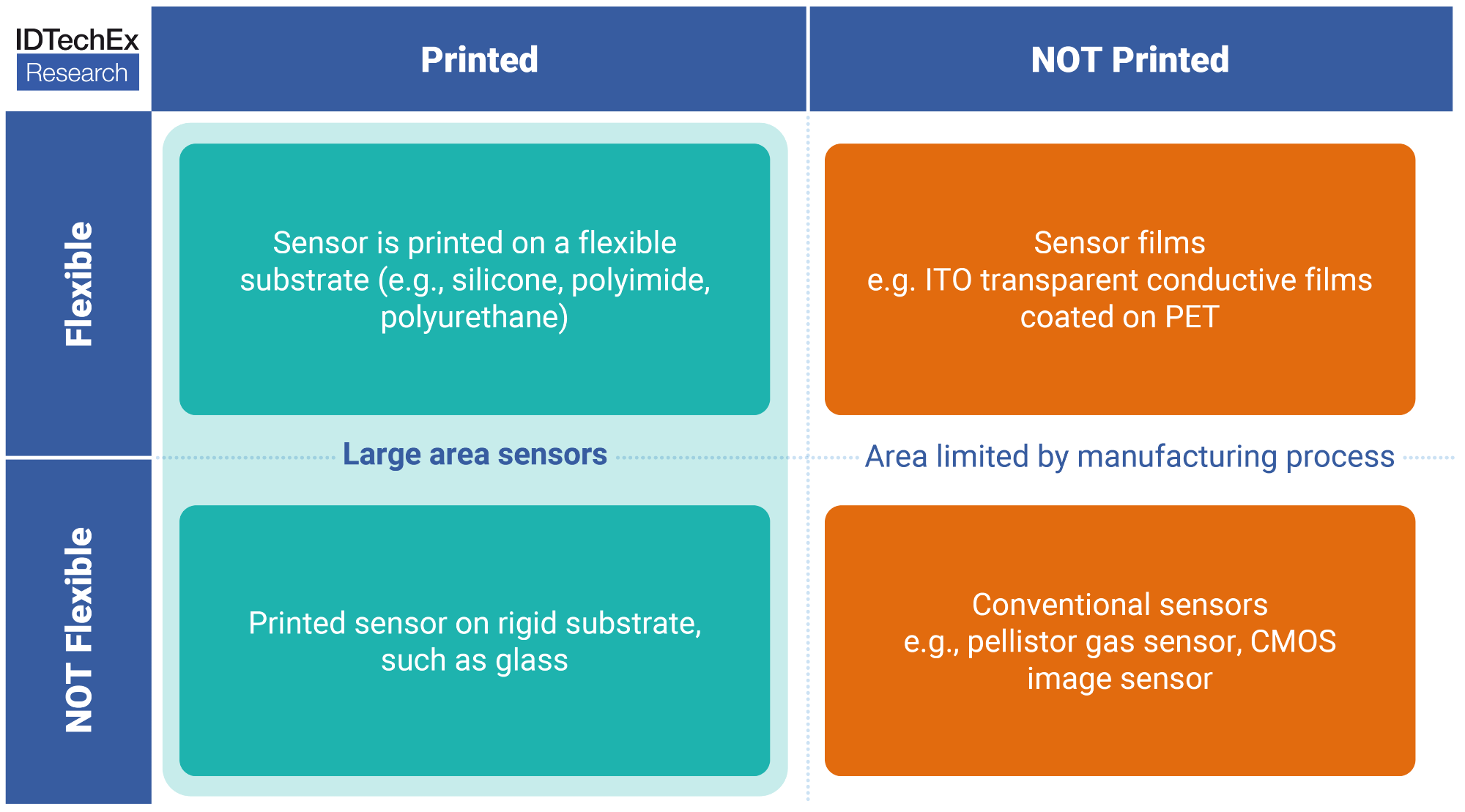Reviewed by Lexie CornerApr 12 2024
Integrated sensors digitizing physical interactions are vital in everyday life. From personalized user experiences to warehouse inventory management, data-driven insights are driving demand for smarter sensors — and lots of them.
 Large area printed and flexible sensor technology. Image Credit: IDTechEx
Large area printed and flexible sensor technology. Image Credit: IDTechEx
Some believe that printing sensors is key to meeting this demand. Using established printing methods, sensors capable of measuring pressure, force, touch, light, gas, temperature, and more can be manufactured in large areas at high volumes. While printed sensors have historically struggled to compete with conventional sensing solutions on cost alone, the tides are turning. Mass digitization demands greater, more seamless digital integration, and large-area printed sensors are positioned to empower the next generation of smart sensing solutions behind this.
Large Area: Printing Sensors Is the Key to Large Area Sensing
Mass digitization will see data captured across more surfaces, and large-area sensors naturally represent a solution to meet this need. Large-area sensors mapping surface interactions offer greater spatial information and enhanced data granularity than using single-point sensors alone. To obtain sufficiently large-area sensors, printing becomes somewhat necessary, offering production in vastly expanded dimensions than what is possible using subtractive manufacturing processes.
Large-area printed sensors are witnessing sustained growth in consumer electronics applications for mapping surface interactions. Major PC manufacturers have begun employing large-area printed force sensors within laptop trackpads, offering dynamic 3D touch functionality to enhance the user interface experience. Printed photodetectors are emerging within OLED display stacks to provide multi-touch fingerprint authentication with minimal impact on overall device thickness. Multi-touch authentication using printed photodetectors promises up to 700 million times greater security than current single-finger methods.
It is unsurprising that smartphone and laptop products represent strong routes to market for printed sensors. These devices contain pre-existing large-area user interfaces that easily benefit from the added functionality printed sensors offer. Crucially, the fast development times and bespoke nature of consumer electronic sensing requirements complement the capabilities of printed sensor technology providers, who are well suited to co-develop custom sensing solutions.
Multifunctionality: Printed Sensors Offer Hybrid Functionality in a Compact Form Factor
In many sensing applications, measuring more than one metric at a time is required. Take, for example, 3D touch laptop trackpads, where high-accuracy touch detection must be accompanied with force input recognition. Printing sensors as sheets allows different sensing layers to be stacked and combined with minimal impact on form factor or weight. Printed sensors, therefore, offer a relatively straightforward way of integrating multifunctional sensing into existing products.
Automotive sector interest is driving multifunctional printed sensor growth opportunities in applications such as the thermal management of electric vehicle batteries. Hybrid printed temperature sensors can detect cell hot spots, while pressure sensing layers monitor battery swelling indicative of cell failure. Moreover, printed sensors augmented with printed heater layers provide the additional means to address these measurements, offering a complete active thermal management solution. Deployment, charging and discharging optimizations all increase battery capacity and prolong lifetime, and could be worth up to US $3000 in savings per vehicle.
The automotive sector is immersed in a period of sustained technological redefinition, with electrification and autonomy meta-trends molding the future of mobility. So, too, are automotive sensing requirements evolving, which lead printed sensor growth opportunities for enabling multifunctional technology solutions. If key cost, weight, and energy efficiency thresholds are met, printed sensors have the potential to define future electric vehicle sensing requirements before battery chemistry and design convergence invites more standardized solutions.
Flexibility: Balancing Form and Function With Flexible Sensors
Rigid sensors and detectors are often poorly suited for applications that require conformal sensing across non-planar surfaces – for example, X-ray medical imaging where, ideally, detectors would conform to limbs. Printing sensors on flexible substrates, such as PET, polyurethane, or polyimide, offers a conformable sensing solution that non-printed sensors struggle to replicate. The variety of elastic, thermal, and even biodegradable properties available means that sensing solutions are highly customizable and easily tailored for end-use applications.
Emerging growth opportunities for flexible photodetectors target displacing incumbent sensing technologies that would clearly benefit from greater flexibility and non-planar measurement. One such example includes large-area photodetectors for X-ray imaging. Flexible X-ray sensors that conform to the body offer the potential to improve medical diagnosis, while in industrial applications, the ability to image in confined spaces promises more time-efficient non-destructive component testing.
Flexibility is only desirable in a handful of photodetection applications, with more promising prospects residing with printed sensor technologies such as force, strain, and temperature sensing. Yet, some flexible photodetectors show the rare potential to compete on cost with existing image sensing solutions, for example, in X-ray and SWIR detection. However, growth prospects for printed photodetectors displacing incumbent image sensors will be contingent on overcoming steep and well-defined performance criteria.
Conclusions and Outlook
Previously, printed sensors’ inability to meet critical cost, performance, size, and reliability thresholds stymied penetration into key product markets. But with mass digitization driving the need to capture data across more and more surfaces, large-area sensing is quickly emerging as the higher-valued market differential for printed sensor technology.
Saturation in consumer electronics product markets is driving interest in large-area sensors that offer innovative new functionality, and printed sensor technology providers are well-positioned to keep pace with fast development cycles. Multifunctional and flexible printed sensors are also increasingly desirable for use in the medical and electric vehicle industries. While conventional sensors can individually achieve large-area sensing, multi-functionality, and flexible form factors, the most efficient way to combine all three is with printed sensors.
Looking forward, IDTechEx predicts that the printed sensor market will reach US $960 M by 2034. The growth anticipated will be driven by new opportunities unlocked by flexible large area and multifunctional sensors in applications such as battery health management, biometric authentication on flexible displays, and even flexible X-ray medical and industrial imaging.